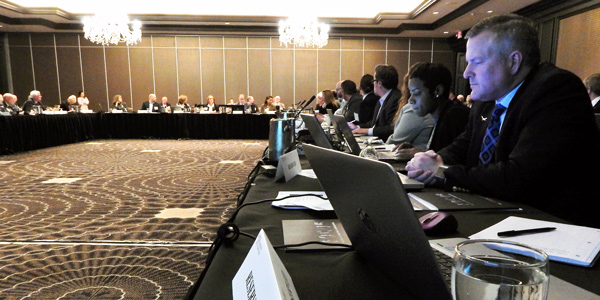KANSAS CITY, Mo. — SPP’s Regional State Committee (RSC) last week approved the scope for a study of cost allocation in wind-rich areas, a problem that grows along with the RTO’s wind generation.
The study will work with SPP staff to review correlations between generation and load flows on systems below 300 kV and identify potential rate approaches, selecting up to three for further review. Final recommendations are due back to the RSC in April 2019.
“We’re not throwing the highway/byway out,” said Cost Allocation Working Group (CAWG) Chair John Krajewski, who represents the Nebraska Power Review Board, during the RSC’s Apr. 23 meeting, referring to the methodology by which SPP allocates transmission costs according to project size.
Under highway/byway, facilities of 300 kV or more are considered highway facilities and their costs allocated on a regionwide, postage stamp basis; facilities between 100 kV and 300 kV are categorized as byway facilities, with two-thirds of the costs assigned to the host zone and one-third allocated regionwide. Projects under 100 kV are allocated entirely to the host zone.
The RSC in January directed the CAWG to study the issue, following a presentation by Sunflower Electric Power on cost allocation issues in wind-rich areas. (See “Committee Takes on Cost Allocation Issues” in Mountain West, Cost Allocation Top SPP RSC Concerns.)
Sunflower’s Al Tamimi told the RSC in January transmission projects used to be based on changes in load or in designated resources in the same geographical area where the facilities are built. Today’s renewable generation is built at great distances from load centers, with many wind projects in small load zones exported elsewhere, he said.
While the local zones don’t necessarily benefit from the reduced energy costs from the additional wind, they are saddled with the byway costs in the highway/byway methodology, Tamimi said.
CAWG to Get Liaison with HITT
The RSC determined the CAWG should have a liaison on the Holistic Integrated Tariff Team (HITT), given that the group’s work overlaps with the HITT’s proposed scope. “HITT’s work touches on everything the RSC does,” said Oklahoma Corporation Commissioner Dana Murphy.
The committee left the recommendation on a CAWG liaison to HITT Chair Tom Kent.
The RSC also voted unanimously to suspend “until further notice” the CAWG’s work on the new member cost allocation review process.
The committee had asked the group in January to draft a report on the effect of new members on existing cost allocations, a reaction to the Mountain West Transmission Group’s pending integration into SPP. Xcel Energy’s sudden departure from the group has temporarily rendered the report moot.
Committee Approves Triggers to Baseline Cost Escalation
The committee approved a Tariff change that memorializes as a business practice the current practice of using triggers to stop the annual escalation of transmission projects’ undefined baseline costs.
The Markets and Operations Policy Committee approved the Project Cost Work Group’s (PCWG) revision request on Apr. 10. PCWG-RR255 adds triggers when a designated transmission owner provides 1) SPP a letter of commercial operation; 2) notification that an upgrade is in-service; and 3) notification that an upgrade is complete.
— Tom Kleckner






